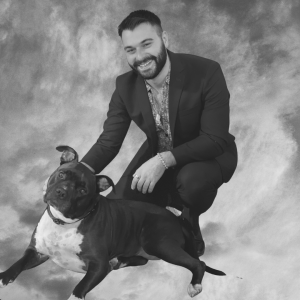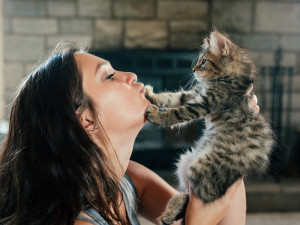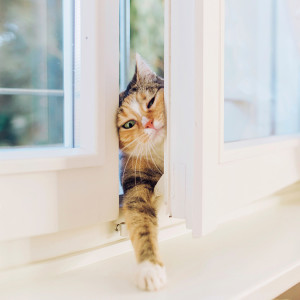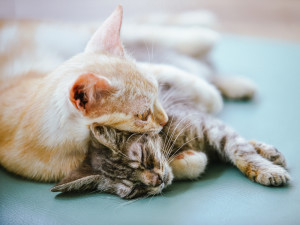Is Cat Fostering the Antidote to Seasonal Depression?
A new study suggests that fostering can help combat the nationwide loneliness epidemic.

Share Article
Despite the country’s population surpassing a quarter of a billion, Americans have seemingly never been lonelier. In fact, it’s a trend that inspired the United States Surgeon General to declare the widespread incident a public health crisisopens in new tab last summer. I’ll let people smarter than myself dissect whether it’s due to the ever-growing prevalence of social media, a COVID-lockdown hangover, or somewhere in between.
What I do know is that there are plenty of actions you can take to feel less alone, such as adopting a pet. But if you’re like me and flirt with commitment issues, new research promises that simply fostering is just as effective.
Apparently, if you’re lonely, you should get a cat.
Researchers at the University of Georgia and Brenau University recently examined how fostering a cat can help combat loneliness in older adults. The studyopens in new tab was funded by the nonprofit Human Animal Bond Research Institute and featured rescue cats from the Athens Area Humane Societyopens in new tab and Campus Catsopens in new tab; 29 individuals over the age of 60 who live alone without aid participated.
Each volunteer was paired with a cat and instructed to foster them for a minimum of four months with the option to eventually adopt, of course. Before starting the trial period, participants completed surveys on their levels of loneliness, physical health, mental health, and self-efficacy. Researchers conducted follow-up surveys after one month, four months, and potentially a year if they opted to foster-fail their kitty.

Six of the 29 participants couldn’t hang and didn’t make it to the four-month mark, to which I say, “Rude.” However, of the 23 who remained, nearly everyone — 95 percent to be exact — adopted their cat after the trial period to a resounding, “Hell yeah,” from this writer. Researchers noted a significant improvement in loneliness and mental health levels after the four months, as well as positive upticks in physical health.
“Our results show that by removing some perceived barriers to pet ownership, including pet deposit fees, pet adoption fees, pet care supplies and veterinary support, we can not only help older adults live healthier, happier lives, but we can also spur the fostering and adoption of shelter cats into loving homes,” Dr. Sherry Sanderson, an associate professor of biomedical sciences at the University of Georgia’s College of Veterinary Medicine and the study’s lead researcher, said in a statement.opens in new tab
Sophia Baer, a safety-net coordinator and member of the foster team at The Animal Refuge League of Greater Portlandopens in new tab (ARLGP) in Maine, confirms that one of the primary benefits of fostering versus outright adopting is the lack of financial strain. While the University of Georgia study focused solely on people over 60, Baer is confident that the mental boost brought by fostering extends to those of all ages.
She explains that for families with children, fostering can also help teach kids the commitment necessary for pet parenthood. For younger adults who might crave the company of a cat but can’t afford one, fostering is a perfect alternative.
This is a great time of year to start fostering.
It’s never a bad time to start fostering, but as temperatures continue to drop and snow piles up, now could be one of the most useful. Seasonal depression is a condition that affects roughly five percentopens in new tab of the population and whose symptoms can often be so overwhelming they interfere with daily functioning. Fostering a cat probably won’t entirely cure you of the winter blues but it sure can help minimize its impact.
“For many folks, especially those who live by themselves, having company in the form of a bouncy, bubbly kitten or a senior cat who lives for a lap to sit on can make the difference between feeling like you are living in an empty home and a home full of life,” Baer says.
She references former ARLGP foster volunteers who were aided by the company of a cat during periods of profound sadness, including while navigating the grieving process. Baer explains how redirecting their attention and love onto an animal helped people find meaning through these times of great despair.
She also recalls having fosters with cancer diagnoses who, knowing their time could be limited but that they still have so much love to give, found the fostering experience considerably rewarding. Baer adds: “It gives someone the ability to channel their own pain into the ability to turn the animal’s life from one of isolation into one full of love.”
Plus, it just feels good.
Of course, you don’t have to be battling mental illness or facing a colossal tragedy to enjoy the perks of cat fostering, nor are you the only one who will gain from this action. Crucially, fostering opens up space in local shelters so that more animal lives can be saved. This is in addition to the kitty you’re welcoming into your home who will now have a place to grow and come into their own.
“Taking in an under-socialized kitten born outside and transforming them from fearful and reactive to enjoying sitting in your lap brings our fosters so much pride. Being involved in your community and knowing you are making a difference for your local shelter and an animal’s life is a really impactful feeling,” Baer explains.
I get it: Opening your house and heart to an animal that’s likely not destined to be there long-term is a tough gig to sign up for. But Baer reminds us that the bittersweet feeling of finding your foster a permanent home is more than worth it.
Not only will you be opening space in local shelters but you’ll also be setting up pets for success. By spending time with them and relaying information on their personalities and needs to the rescue, they’ll be afforded a family fit for their specific traits. As Baer puts it, “By fostering just one animal you could save the lives of even more.”

Sean Zucker
Sean Zucker is a writer whose work has been featured in Points In Case, The Daily Drunk, Posty, and WellWell. He has an adopted Pit Bull named Banshee whose work has been featured on the kitchen floor and whose behavioral issues rival his own.
Related articles
![Tabby cat trying to open with her head window in order to enter the house.]()
Has a Cat Wandered Into Your Life? It Could Be the Cat Distribution System
TikTok thinks the universe just provides you a cat—is that really a thing?
![two bonded kittens snuggling]()
Why You Should Adopt a “Less Adoptable” Cat
Here’s why bonded kitties, senior cats, and felines with FIV make just as amazing pets as any other.
![A woman staring at her computer while holding her dog close.]()
10 Things to Consider Before Adopting a Pet
It’s a big decision, so check these boxes before you sign on the dotted line.
![Girl sitting on couch hugging her playful dog with the window open to outside]()
7 Myths About Rescue Animals—Debunked
For starters: No, they’re not all traumatized and yes, you can find a purebred puppy at a shelter.
![Man wearing pink headphones playing with dog on sofa with plants and a painting in the background]()
Should You Do a Trial Run Before You Adopt a Pet?
Some animal rescues allow trial runs for interested adopters. Get the scoop on how foster-to-adopt programs work.
![A woman with tattoos hugging her white cat in a cluttered, art-filled room]()
Cats, Priceless. Cat Parenthood, Not So Much
A rundown of the most common cat expenses.









